A military fitness coach believes he could be Britain’s most prolific victim of identity theft as hundreds of romance fraudsters have stolen his name and face to con unsuspecting women across the world.
Farren Morgan, 38, from Essex, has been continuously battling the issue across social media platforms – and says there are now so many accounts using his photos and videos that the task to block them all has become ‘like whack-a-mole’.
And in one instance when the father-of-one complained to Instagram, it was his account rather than those of the con artists that was shut down – because ‘they didn’t know who the real Farren Morgan was or who was scamming who’.
Five years on since he first noticed the fake accounts, the former Coldstream guard says the problem has become increasingly worse, with fraudsters now using AI tools to manipulate videos of the former soldier to con vulnerable women.
In its worst extremes, victims of scammers on Facebook, Instagram, X and TikTok posing as Farren have been conned out of thousands of pounds – but the emotional cost has been equally high.
Some have been left so devastated at the revelation they have been communicating with a scammer that they have reached out to the real Farren believing their ‘romance’ can continue.
In one instance, a woman who refused to acknowledge she had been catfished began messaging Farren’s wife, parents and other close relatives to tell them he had been having an affair with her – such was her belief their relationship had been ‘real’.
A quick glance on Facebook alone shows the extent of the problem. Multiple accounts appear under the name ‘Farren Morgan’ and all use a stolen profile photo, typically of him in his military uniform or working out. The majority state he is ‘single’ or ‘looking for love’ – although the real Farren is happily married.

Military fitness coach Farren Morgan believes he could be Britain’s most prolific victim of identity theft after hundreds of romance fraudsters have stolen his name and face

The former Coldstream guard says the problem has become increasingly worse, with fraudsters now using AI tools to manipulate videos to con vulnerable women
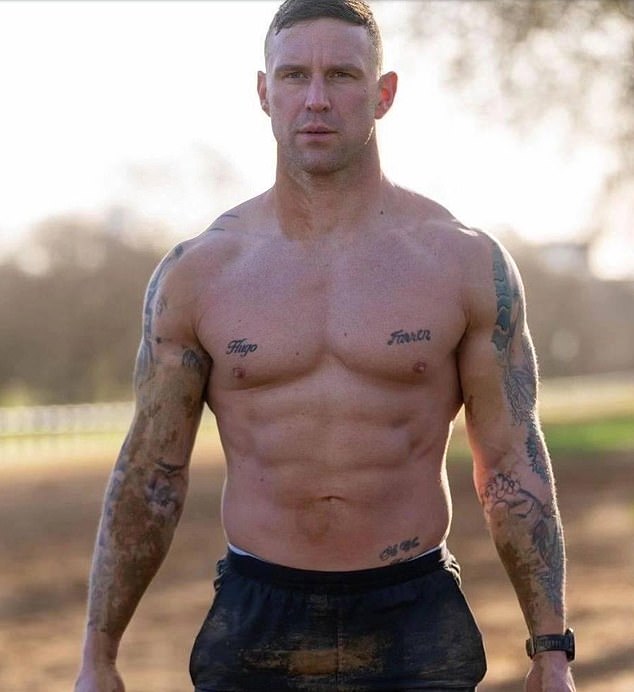
Farren Morgan, 38, from Essex, said there are now so many accounts using his photos and videos that the task to block them all has become ‘like whack-a-mole’
The locations of the various Farren Morgans vary widely, from cities around the UK to California, Idaho, Mississippi and New York – and even Australia, the UAE, Syria, Iran and Yemen.
Some however have taken to using Farren’s images, but appear under a different name.
In fact there are so many profiles that looking through them proves a time-consuming task, or as Farren puts it: ‘There’s that many you literally can’t get to the end of it.’
Farren believes the scams started around five years ago when he kickstarted his Instagram account (@farrenmorgan), which now has more than 281,000 followers.
He told MailOnline: ‘I started a competition to get some awareness to my Instagram page for people to win a training ebook, weighted vests and fitness supplements.
‘But then a short while later I got a message off somebody saying, “Oh, are you sending out the winning results early?”
‘When I told them I wasn’t, they said they’d received a link through a page with my profile picture and my name saying that they had won.
‘When they clicked on the link, they were asked to pay £20 to receive the prizes, worth £300, so they did it – and then the account blocked them.
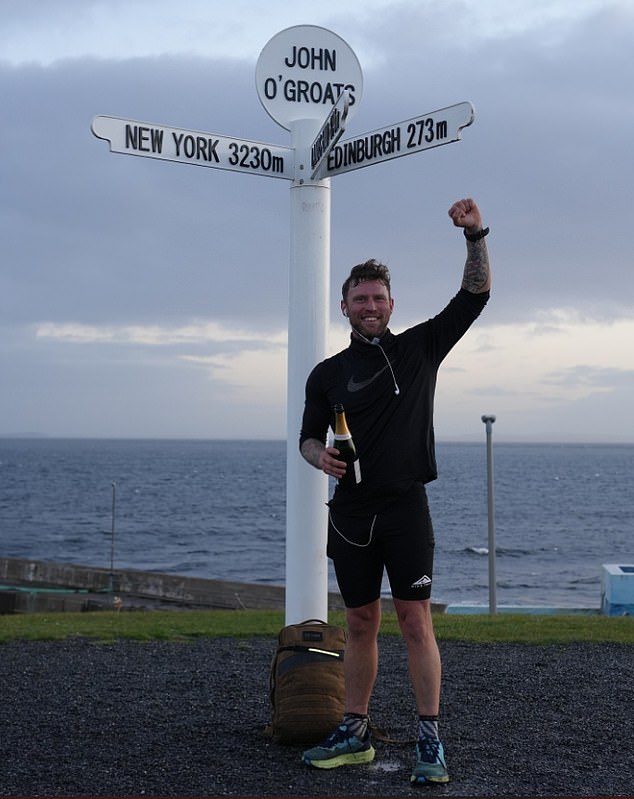
Farren, pictured recently after completing a 1,000-mile ‘ruck’ challenge from Land’s End to John O’Groats, said he has had to endure five years of scammers using his name and face

Some women have been left so devastated at the revelation they have been communicating with a scammer that they have reached out to Farren believing their ‘romance’ can continue
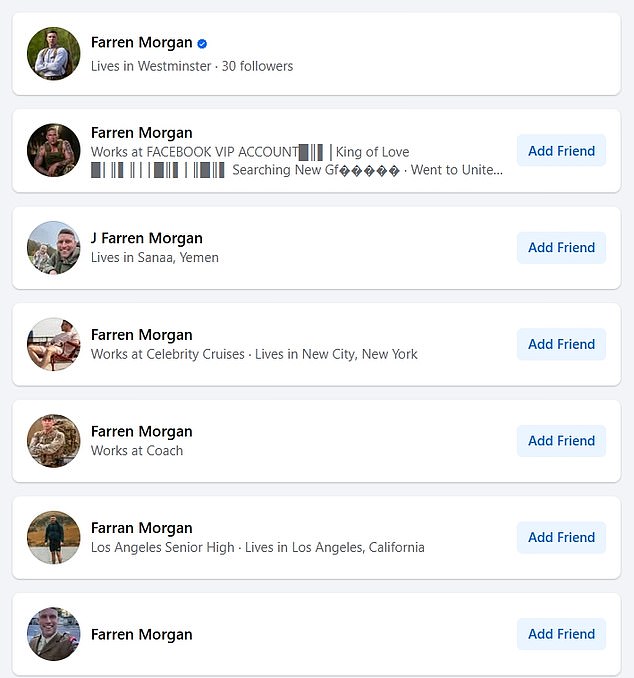
A screenshot from Facebook shows just a small selection of the hundreds of fake profiles set up with his name and photographs
‘When I looked into it, the user names looked the same but were slightly different to mine – so Farren Morgan with a full stop at the end, or Farren Morgan with a hyphen and so on.’
As similar scams began popping up, Instagram took action, resulting in even Farren’s genuine account being taken down – ‘but the fake accounts were still going’.
He continued: ‘People were still messaging these fake Farren Morgan profiles thinking it was genuine, because it hadn’t been deactivated.
‘I was really worried that I would lose people’s trust and my business would suffer.’
When he finally regained control of his business account, The Tactical Athlete, and became verified, Farren vowed never to run another competition in a bid to keep his followers safe from fraudsters.
But the fake accounts continued, with seemingly small-scale scams evolving into larger-scale romance frauds conning vulnerable women out of their savings.
And in the latest development, the fraudsters are now turning to AI to appear ever more convincing.
He explained: ‘Over the last few years it’s developed a hell of a lot. It was very rare that I’d be contacted, but these days I receive at least five messages every day alerting me to someone who has fallen victim.
‘I think the worst one recently was one woman who sent over £500 in phone cards, £2,000 in Bitcoin and another £2,500 in flights to these scammers.
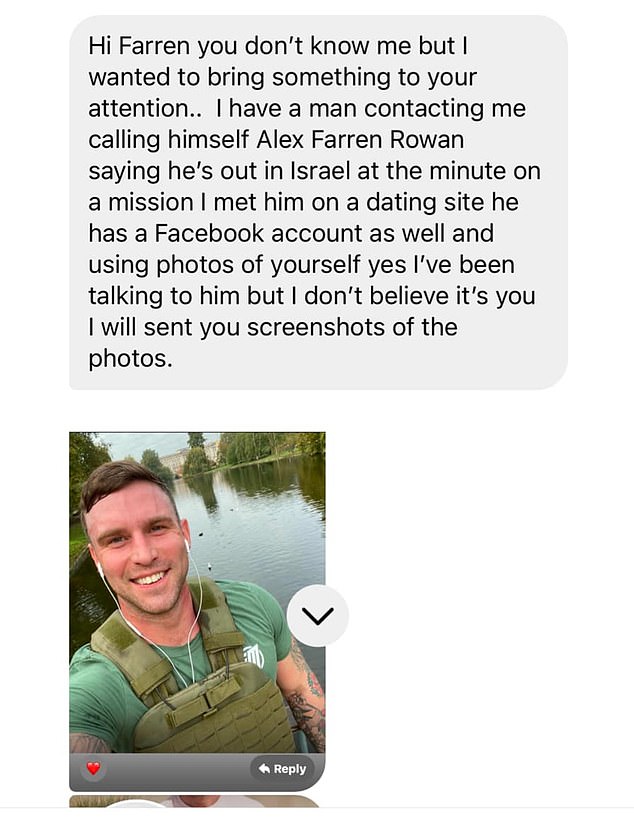
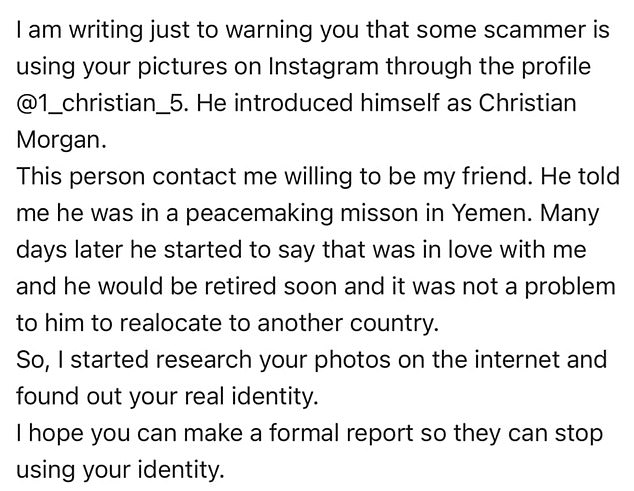
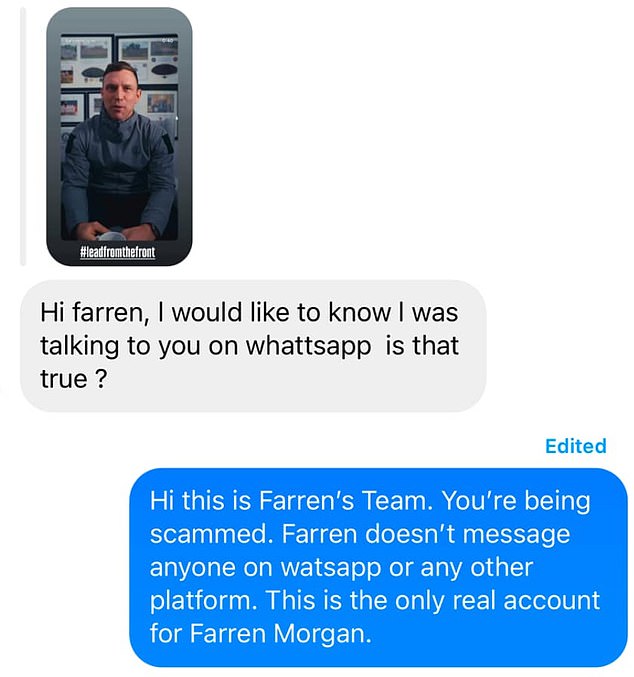
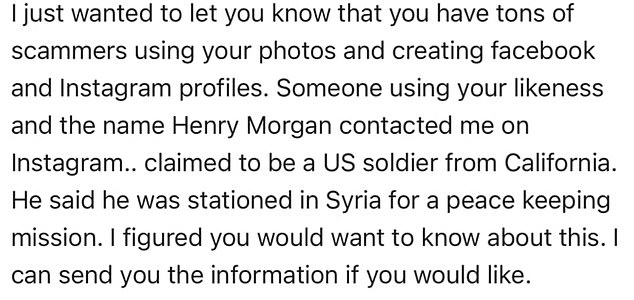
A selection of the dozens of messages Farren receives every month from women saying they have been talking to a person using his name or images
‘And at least three women have been sent videos through WhatsApp, which have been manipulated with AI tools.
‘They can see my face and my lips moving, but it doesn’t sound like my voice. Sometimes my lips don’t match up with the words and they’ll tell the victims that they’re in a war zone or somewhere with bad internet, so there’s lagging.
‘It’s insane really. I feel like the fake profiles have risen tenfold over recent years and the problem is getting worse and worse.
‘I even received a message off someone the other day, saying, “Oh, my mum thinks she’s in a relationship with you. She’s 65. Would you send a message to me now saying that you are Farren Morgan and that you are not in a relationship, so that I can stop her sending money to this person – she has already sent over £5,000.”
‘But I have to be careful because even the ones sending me messages could be scammers trying to get a voice recording to use in their next scam.
‘So I can’t do anything, it’s very, very difficult.’
Experts have warned that deepfake scams are on the rise which use voice cloning tools to deceive their victims.
When the technology first emerged back in the late 1990s, its use was limited to experts with an in-depth knowledge of AI.
However, over the years the technology has become more accessible and more affordable, to the point where almost anyone can use it.

Farren has described the problem as getting ‘worse and worse’ as he struggles to keep up with the number of fake profiles that have proliferated

Farren said he now employs two people to do a ‘daily scout’ for fake profiles – and said more than 400 had been found in one day alone
The tools are so effective that fraudsters can now mimic a victim’s voice using just a three second snippet of audio, which has often been stolen from social media profiles, just like in Farren’s case.
Farren said he now employs two people to do a ‘daily scout’ for fake profiles – and said more than 400 had been found in one day alone.
His team have also unsuccessfully tried to track down the fraudsters, but discovered they are mostly operating from Nigeria, India and Russia, as well as the UK.
Farren said he would like to see social media platforms taking harder action against users who have stolen his photographs and videos to set up profiles in his name.
Asked how he feels five years on since the first fake profiles appeared, Farren said mostly anger and frustration towards the scammers – but also at times, their victims.
‘I’m angry at the scammers, but I’m also angry at the people contacting me who think I can put a stop to this. Many tell me to stop putting images and videos online, but this is my business, this is my life – and I’ve actually doing nothing wrong.
‘My family have been very supportive, especially my wife.
‘Being on social media means I can build my business, but I have learnt the hard way that there can be serious consequences.’
MailOnline reached out to Meta, which runs Facebook, Instagram and WhatsApp, and the platform confirmed it had removed a number of accounts brought to its attention.
Meta added that people who impersonate others on Facebook and Instagram are violating the policies of the platform and it would seek to remove such content.
MailOnline also reached out to TikTok, which said that a number of fake accounts had been removed for breaching its impersonation policies. It added that its community guidelines are clear on not allowing any attempts by users to defraud or scam others.
TikTok also said it did not allow harmfully misleading AI-generated content or edited media and such content if discovered would be removed.







